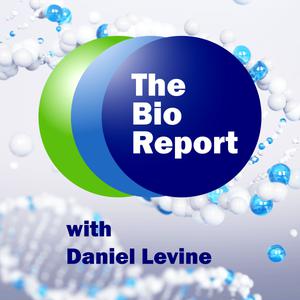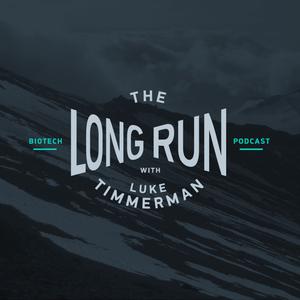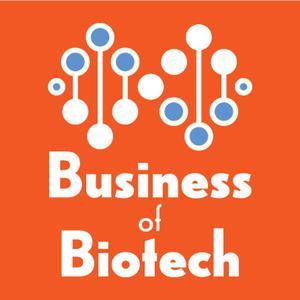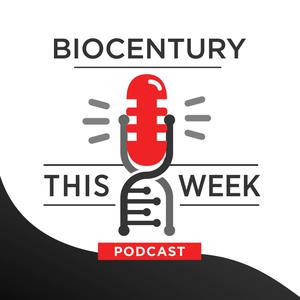
The Bio Report
Levine Media Group
- 20 minutes 3 secondsTeaching an Old Drug a New Trick to Prevent Lyme Disease
Each year, an estimated 400,000 people in the United States will be diagnosed with Lyme disease, a billion-dollar healthcare problem caused by a bacterial infection that is transmitted through the bite of a tick. The condition can cause joint pain and fatigue, but is treatable with antibiotics. Left untreated, though, it can progress and cause more serious symptoms including facial palsy, an irregular heartbeat, and nerve pain. Tarsus Pharmaceuticals is developing a human formulation of the antiparasitic lotilaner, to prevent Lyme disease. We spoke to Bobby Azamian, CEO of Tarsus, about Lyme disease, the case for the company’s experimental prophylactic drug TP-05, and why you may already have been using a form of the drug to protect a four-legged member of your household.
1 May 2024, 7:00 am - 32 minutes 38 secondsA New Class of Cell Therapies to Target Solid Tumors
In February, the U.S. Food and Drug Administration approved the first tumor-infiltrating lymphocyte, or TIL therapy, for solid tumors. The approval was hailed as a milestone that points the path forward for a new class of cell therapies for solid tumors. We spoke to Jason Bock, CEO of CMTC, the joint venture between Resilience and MD Anderson Cancer Center, about the emerging area of TIL therapies, the significance of the first approved therapy in the class, and how they may address existing limitations of CAR-T therapies.
24 April 2024, 7:00 am - 35 minutes 4 secondsTargeting the Tumor Microenvironment with Lipid-Based Immunotherapies
Lipids have long been used as drug delivery vehicles, but HighField Biopharmaceutics is repurposing lipids as drugs to fight cancer. The company’s technology platform is seeking to change the immunotherapy landscape with new treatments that are better targeted, more potent, and less toxic. We spoke to Don Wyatt, chief business officer for HighField Biopharmaceuticals, about the tumor microenvironment, HighField’s platform technology, and how it is developing lipid-based medicines to overcome challenges of existing immunotherapies.
17 April 2024, 7:00 am - 32 minutes 4 secondsA Company Born from a Father Who Wore His Heart on His Sleeve
Jeremiah Robison’s daughter Sofia was born with cerebral palsy, a congenital movement disorder. Watching her physicians use body monitors to measure her gait, and later apply functional electrical stimulation as physical therapy, gave him an idea to combine the two to create a sleeve that could be worn on her leg to improve her ability to walk. Now Cionic, the company he co-founded, is producing its Neural Sleeves to help people with a variety of mobility impairments better navigate the world. We spoke to Robison, CEO of Cionic, about the Neural Sleeve, how functional electronical stimulation helps people with movement disorders walk, and how the use of adaptive algorithms continuously optimizes the stimulation it delivers.
10 April 2024, 7:00 am - 24 minutes 15 secondsUsing AI to Improve Burn Care
Physicians treating people with burns typically incorrectly assess the depth of burn wounds in about 25 to 30 percent of cases. That, in part, is due to a lack of diagnostic tools to assess the severity of a burn and to determine the best approach to treatment. Spectral AI has developed the DeepView System, a predictive device that offers clinicians an objective and immediate assessment of a wound’s healing potential prior to treatment or other medical interventions. We spoke to Pete Carlson, CEO of Spectral AI, about the company’s AI-driven DeepView System, how it works, and how it changes outcomes for patients.
3 April 2024, 7:00 am - 32 minutes 30 secondsA Home for Biotech in the City that Never Sleeps
New York City is not the first place that comes to mind when thinking of biotech clusters, but the Big Apple has been a growing center of biomedical innovation with its mix of academic research hospitals, finance, and growing number of biopharmaceutical companies. One place that’s seeking to serve as both a home to innovative companies and facilitate collaborations is Cure, which describes itself as a healthcare innovation campus. We spoke to Seema Kumar, CEO of Cure, about how it operates, its various initiatives, and what can be done to accelerate the movement of innovative technologies from the lab to the marketplace.
27 March 2024, 7:00 am - 30 minutes 36 secondsBiopharma R&D Growing Stronger
Funding levels, drug launches, and R&D success rates all grew in 2023, according to a new report from the IQVIA Institute for Human Data Science. Global funding of biopharmaceutical research and development increased to $72 billion, up from $61 billion in 2022. M&A activity jumped to $140 billion from $78 billion during the same period. We spoke to Murray Aitken, executive director of the IQVIA Institute for Human Data Science, about its Global Trends in R&D 2024 report, what he’s watching, and why the new patent cliff for the industry will be less threatening than the last one.
20 March 2024, 7:00 am - 32 minutes 38 secondsThe Benefits of Having a Multitude of Cins
In January 2023, AstraZeneca agreed to acquire CinCor Pharma, the CinRx cardio-renal disease therapy subsidiary, for $1.3 billion. The deal included a potential additional $500 million milestone payment. The price represented a 121 percent premium to CinCor’s market value at the time and could grow to more than a 200 percent premium if the milestone is met. The sale represented validation of CinRX’s portfolio approach to build multiple biotech companies supported with a dedicated funding mechanism. We spoke to Jon Isaacsohn, founder and CEO of CinRx, about the company’s portfolio approach, how its business model allows it to accelerate the development of needed medicines, and its efforts to develop new obesity therapies.
13 March 2024, 7:00 am - 24 minutes 3 secondsMaking ADCs Smarter and Safer with a Simple Twist of Fate
Antibody-drug conjugates can deliver chemotherapy directly to tumors but more than 95 percent of the dose often ends up in healthy tissues, decreasing efficacy and increasing toxicity. Mythic Therapeutics FateControl technology improves the uptake of ADCs in cancerous cells while avoiding the release of their toxic payloads in healthy ones. This promises to increase efficacy of these therapies in a wide range of cancers without causing unacceptable side-effects. We spoke to Brian Fiske, co-founder, chief scientific officer of Mythic, about the challenges that have held back the benefits of ADCs, how the company’s FateControl technology addresses those, and how it is thinking of building a pipeline of ADCs across indications.
6 March 2024, 8:00 am - 19 minutes 17 secondsTargeting a Natural Repair System to Restore Brain Health
The HGF/MET neurotrophic system plays a critical role in the maintenance and repair of connections in the brain. Enhanced signaling along this pathway has the potential to reduce inflammation, slow neurodegeneration, and provide neuroprotection. Athira Pharma is pursuing small molecule drugs that target this pathway to address a range of neurodegenerative conditions. The company is currently conducting a phase 2/3 study of its lead therapeutic candidate, fosgonimeton, in mild-to-moderate Alzheimer’s disease. But the study comes after the experimental therapy failed to meet its primary endpoint in a phase 2 study in Alzheimer’s disease and a phase 2 study in Parkinson’s disease dementia and dementia with Lewy bodies. We spoke to Rachel Lenington, chief operating officer of Athira Pharma, about the case for targeting the HGF/MET neurotrophic system in neurodegenerative diseases, how its experimental therapy fosgonimeton works, and why its continuing to pursue the therapy despite earlier failures.
28 February 2024, 8:00 am - 32 minutes 6 secondsPrograming Cells in a Predictable and Scalable Way
The advent of induced pluripotent stem cells, cells that can be coaxed into becoming virtually any type of cell within the body, promised to usher in a new era of regenerative medicine and improved drug discovery. In practice, though, the ability to use these cells to develop desired cell types has proved challenging to do in a predictable way and at scale. Bit.bio, has developed a synthetic biology platform that it says allows it to industrialize this process and produce desired cells in a consistent manner. We spoke to Mark Kotter, founder and CEO of Bit.Bio, about the company’s platform technology, its effort to develop cell therapies, and its growing offering of precision reprogramed human cells for drug development.
21 February 2024, 8:00 am - More Episodes? Get the App
Your feedback is valuable to us. Should you encounter any bugs, glitches, lack of functionality or other problems, please email us on [email protected] or join Moon.FM Telegram Group where you can talk directly to the dev team who are happy to answer any queries.
 The Long Run with Luke Timmerman
The Long Run with Luke Timmerman
 The Readout Loud
The Readout Loud
 Biotech 2050 Podcast
Biotech 2050 Podcast
 Business Of Biotech
Business Of Biotech
 BioCentury This Week
BioCentury This Week
 Raising Health
Raising Health